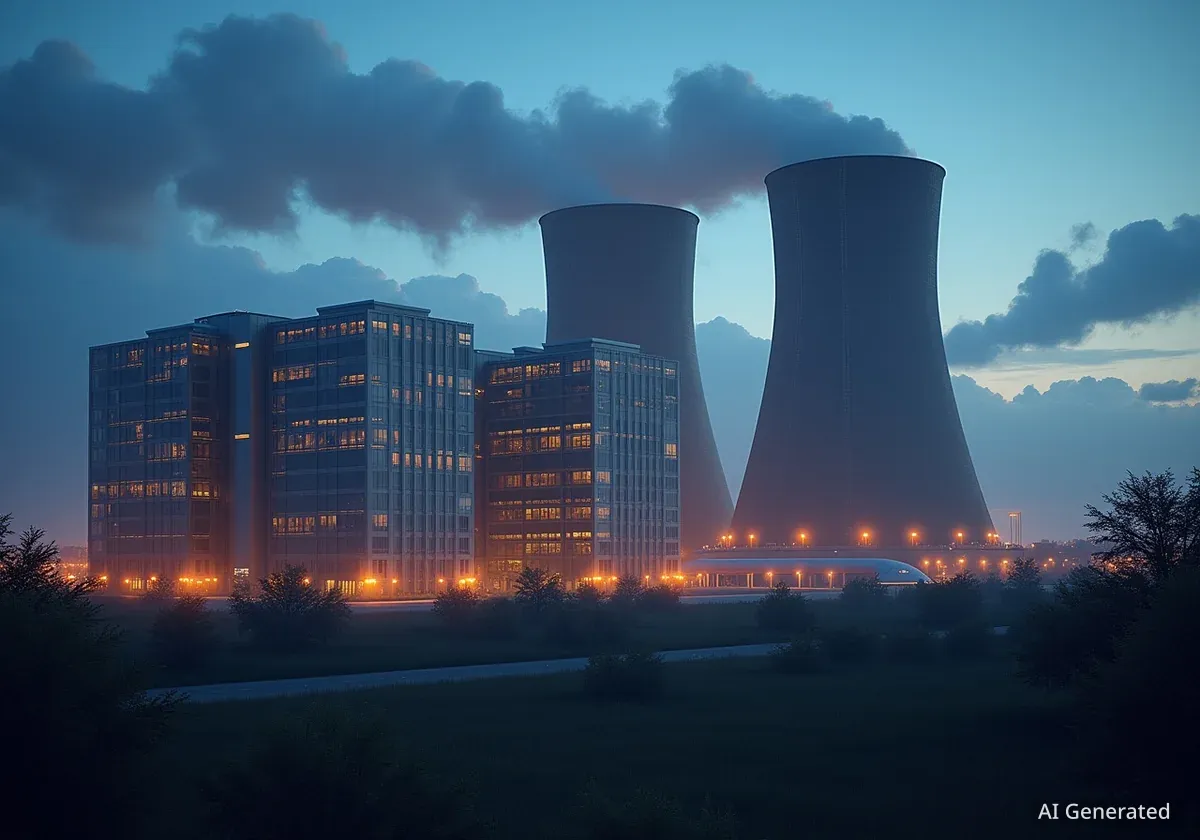A massive new artificial intelligence infrastructure project, known as Stargate, is reportedly in development with a projected cost of half a trillion dollars. The initiative, which includes plans for a major data center expansion, aims to provide the immense computing power required for the next generation of AI technologies.
The project highlights the growing demand for energy to power advanced AI systems. To meet these needs, developers are exploring nuclear energy as a primary power source, a move that some experts describe as a matter of national security.
Key Takeaways
- A new AI supercomputer and data center project named Stargate is in the planning stages.
- The total estimated cost for the multi-phase project is approximately $500 billion.
- The initiative is closely linked to figures like Sam Altman, signaling a major push in AI infrastructure.
- Nuclear power is being considered as a key energy source to meet the facility's massive electricity demands.
- Experts have raised the issue of energy independence for AI development as a national security concern.
The Scale of the Stargate Initiative
The Stargate project represents a significant escalation in the global race to build foundational infrastructure for artificial intelligence. The proposed half-trillion-dollar budget underscores the enormous capital investment now considered necessary to stay at the forefront of AI development.
This initiative is not just a single data center but a multi-phase plan that will unfold over several years. The initial phases focus on constructing a core supercomputing facility, with subsequent expansions designed to scale its capabilities significantly. According to reports, the project's leaders have already announced the beginning of this massive expansion.
What Are AI Data Centers?
AI data centers are specialized facilities that house thousands of powerful computer servers and graphics processing units (GPUs). Unlike traditional data centers, they are designed specifically to handle the intense computational workloads of training and running large AI models, which requires vast amounts of processing power and electricity.
A New Era of Computing Infrastructure
The sheer size of the Stargate project aims to address a critical bottleneck in AI progress: the availability of sufficient computing power. As AI models become more complex, their demand for processing resources grows exponentially. Stargate is designed to meet this future demand head-on.
The project's backers believe that such a large-scale facility will not only accelerate AI research but also provide a strategic advantage. Access to this level of computing power could determine which companies and countries lead the next wave of technological innovation.
Energy Demands and the Nuclear Option
One of the most significant challenges for a project of this magnitude is securing a reliable and immense source of power. The energy consumption of advanced AI data centers is substantial, often equivalent to that of a small city. Standard power grids can be strained by such a concentrated load.
To solve this problem, project planners are reportedly looking toward nuclear energy. This approach involves either co-locating the data center with existing nuclear power plants or developing new, dedicated small modular reactors (SMRs) to provide clean and consistent electricity.
AI's Growing Energy Footprint
According to the International Energy Agency, the electricity consumption of data centers, AI, and cryptocurrencies could double by 2026. The AI sector alone is projected to consume at least ten times more electricity in 2026 than it did in 2023, highlighting the urgent need for sustainable and powerful energy solutions.
Why Nuclear Power is a Consideration
Nuclear energy offers several advantages for powering a super-scale data center like Stargate. It provides a constant, high-output source of power that is not dependent on weather conditions, unlike solar or wind.
Furthermore, it is a carbon-free energy source, which helps address environmental concerns associated with the massive electricity consumption of AI. An expert in energy infrastructure commented on the strategic importance of this decision.
"Powering the future of artificial intelligence is fundamentally a national security issue. Relying on a stable, domestic, and high-density energy source like nuclear is not just an economic choice; it's a strategic imperative to ensure technological sovereignty."
Strategic Implications for National Security
The discussion around using nuclear power for Stargate has elevated the project's profile from a commercial venture to one with national security implications. Experts argue that ensuring a country's AI infrastructure has an independent and secure power supply is crucial for maintaining a competitive edge in technology and defense.
An uninterrupted power supply guarantees that critical AI systems—used for everything from economic modeling to national defense applications—can operate without risk of disruption. This makes the energy source for projects like Stargate a key component of national strategic planning.
The Role of Key Industry Figures
The involvement of prominent technology leaders like Sam Altman lends significant credibility and momentum to the Stargate initiative. His participation signals that the project is a serious effort by major players in the AI industry to build the next generation of essential tools for artificial intelligence research and deployment.
This leadership helps attract the necessary talent and investment for a project that will require coordination across technology, energy, and construction sectors on an unprecedented scale.
Economic and Technological Impact
A half-trillion-dollar investment in a single technology project is expected to have far-reaching economic effects. The construction and operation of the Stargate data center will create thousands of jobs, from highly specialized engineering roles to construction and support staff.
The project will also stimulate demand in related industries, including semiconductor manufacturing, networking hardware, and software development. The ripple effects of such a large-scale investment could boost economic activity in the region where the facility is located and across the national supply chain.
Pushing the Boundaries of AI
Ultimately, the goal of Stargate is to unlock new possibilities in artificial intelligence. With access to unparalleled computing resources, researchers will be able to train larger and more sophisticated AI models, potentially leading to breakthroughs in fields like medicine, materials science, and climate modeling.
The project is a long-term investment in the foundational technology that is expected to drive economic growth and societal change for decades to come. Its success could help secure a leading position in the global technology landscape for years.





